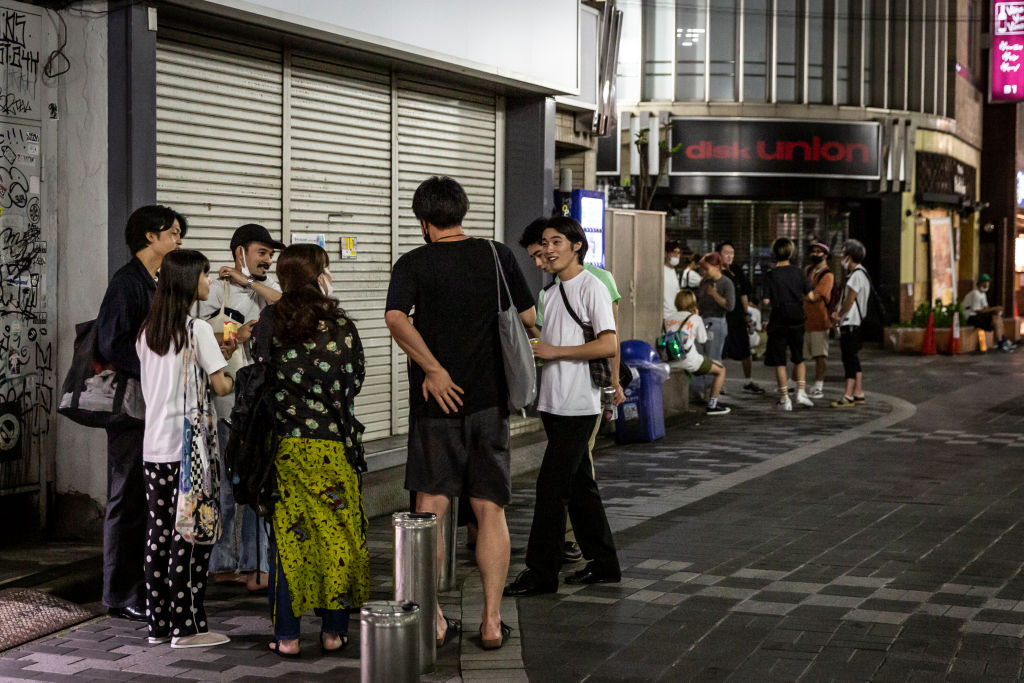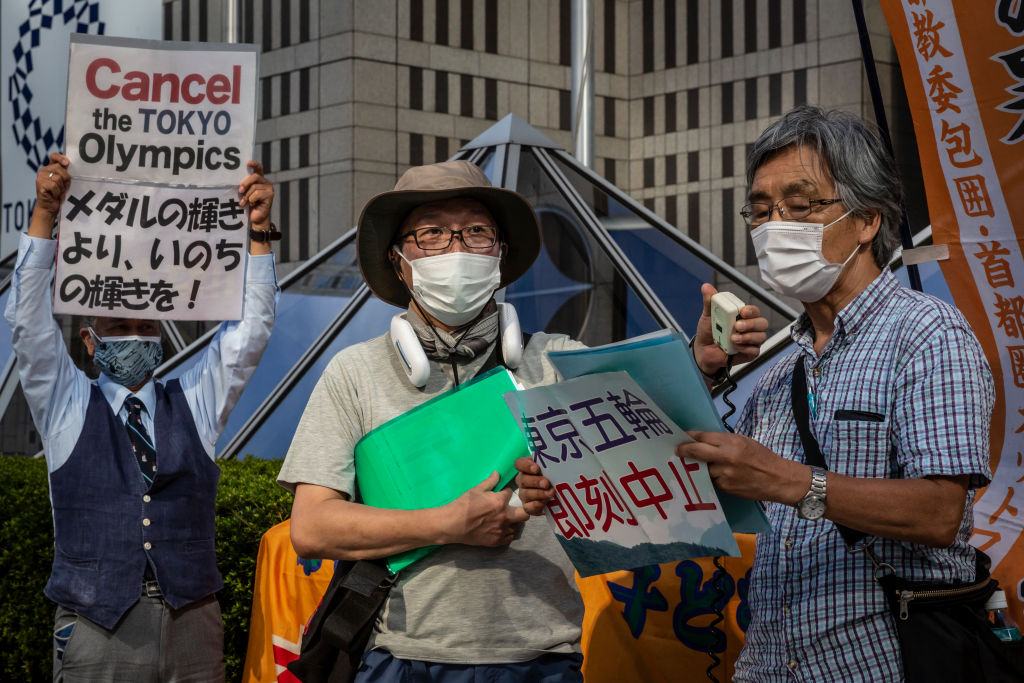On Tuesday evening about a dozen people huddled together around a big screen TV at a sports bar in a residential neighborhood in western Tokyo to watch Japan face off against Spain in the men’s soccer semifinals.
COVID-19 cases are hitting daily records in the Olympic host city, and the Japanese government has declared a state of emergency, asking bars and karaoke parlors to either close or not to serve alcohol and requesting most stores and restaurants to shut at 8 p.m. But the Olympics are in town, and the match is taking place just a 45-minute-train ride away.
To avoid detection, the bar’s owner, Takashi, who asked to only go by his first name, has installed black curtains over the window facing the street, and he asks his guests to walk up the stairs instead of taking the elevator.
He lets his customers know when he’ll be open via LINE, Japan’s most popular instant messaging app. “I don’t say ‘the bar is open.’ Instead, I just write ‘Come by my place tonight if you’d like,’” the 60-year-old tells TIME.
Prime Minister Yoshihide Suga insisted that there is no link between the Tokyo Summer Olympics and the dangerous surge in COVID-19. It’s true that, so far, strict infection control measures have curtailed the spread of the virus from the 60,000-some athletes, coaches, and media and staff who entered Japan for the Olympics and Paralympics.
READ MORE: Tokyo’s Plan to Avoid Pandemic Disaster During the Olympics
But experts—and a lot of Japanese scofflaws—say the government’s decision to plow ahead with the Olympics while also telling people to stay home and obey social distancing has shattered the willingness of many Japanese people to abide by the rules after 18 months of yo-yoing COVID-19 restrictions.
“We’ve been relying on the voluntary behavioral changes of the people,” Hitoshi Oshitani, the virologist who helped devise Japan’s original COVID-19 strategy, tells TIME. “It’s getting very difficult to persuade people to stay at home because we are holding the Olympics. So, we are in a very difficult situation right now.”
Scenes like those at Takashi’s bar are taking place all across Tokyo, and in some areas businesses and revelers are openly defying social distancing guidelines to party and celebrate the Japanese Olympic team’s most successful Games ever—22 gold medals and counting.
Backlash over Olympics and COVID-19 restrictions

Until this latest wave, Japan had been relatively successful against the virus. In early July, the country of 126 million people had recorded about 800,000 coronavirus cases and 15,000 deaths.
In addition to moving early to close its borders and implement testing and contact tracing, the government rolled out a “Three C’s” strategy developed by Oshitani, an easy-to-understand message to avoid closed spaces, crowded places and close-contact settings.
Others credited cultural factors; one widely shared list compiled more than 40 possible reasons cited by the media that COVID-19 infections were limited in Japan. It ranged from a culture of mask-wearing, to the propensity of Japanese people to listen to experts and government recommendations, to a low obesity rate.
Japan has also used state of emergency declarations when cases spiked, which involved a “soft lockdown” approach—asking people to follow social distancing guidelines, rather than making legal mandates. And for the most part people complied.
However, ahead of the Olympics Japan declared a fourth state of emergency for Tokyo as cases surged. More than 80% of Japanese people surveyed in May already opposed holding the Games this year, and the state of emergency only added to frustrations. The latest measures ask people to refrain from unnecessary travel, and call on restaurants and bars to shorten their hours and not serve alcohol.
READ MORE: Japan Has a Plan to Protect the Olympics From COVID-19. But Can It Protect Itself From the Olympics?
But TIME spoke to several bar owners who are still operating. They say their frustrations over the government’s approach, and concern over losing business outweigh their worries about COVID and about getting caught and fined.
Tips on which bars and restaurants are open in certain areas are circulating on Twitter and other social media sites. Online restaurant guides, similar to Yelp, have information about which restaurants are serving alcohol. The owner of the renowned restaurant Gonpachi, where the fight scene from the movie Kill Bill: Volume 1 took place, said he would defy virus restrictions and open as normal.
In Tokyo’s Golden Gai area, known for its tiny bars and eateries, some of which fit only four to six people, chatter and music could still be heard at 1:30 a.m. this week. Most bars have followed the rules and close at night, but for those that do stay open, bartenders are chatting with their customers, their masks pulled down below their chins. Here, it’s impossible to abide by any of Japan’s three C’s of COVID-19 prevention.
A few blocks away in Kabukicho, where the streets are filled with hostess bars and love hotels, people gather in groups, drinking and chatting on the street. Many of them don’t wear masks. A nearby restaurant that serves skewers tells TIME it closes at 5 a.m.
“People felt like the government declared the fourth state of emergency for the Olympics,” says Takashi, the Tokyo sports bar owner. “People are frustrated, and such frustration causes people to break rules.”
Takashi says he heeded the first two states of emergency in the spring of 2020 and earlier this year, but he feels that the government has unfairly targeted restaurants and bars. He also points to government officials who have flouted their own COVID-19 restrictions while asking the public to stay at home. In March, Japan’s health minister apologized over a late-night party involving 23 officials from his ministry, at a time when the government told restaurants and bars to close by 9 p.m.
Ayaka, a 27-year-old who lives in Tokyo, says that it doesn’t make sense to her that the government is urging people not to travel while still allowing people from all over the world to enter Japan. She and her boyfriend went on vacation during a holiday weekend in late July to Hokkaido—500 miles north of the capital.
“What the government is doing about the Olympics and what it is telling local people to do are incompatible, and it is infuriating,” she says. “I know we still have to stay careful not to catch or spread the infection, but I didn’t want to listen to what the government tells us to do anymore.”
Of course, there are many still opposed to the rule-breaks. Ayaka says that she and her boyfriend were afraid of walking around Hokkaido with their suitcases for fear of encountering “quarantine vigilantes.”
COVID-19 in Japan: Bad and getting worse

The change in behavior for many Japanese people couldn’t have come at a worse time.
On Thursday, nationwide cases topped 15,000 for the first time. The same day, Tokyo recorded a single-day record of 5,042 new cases, up nearly 900 from the previous day, which was also a record. People in their 20s and 30s accounted for more than half of the new cases, according to local media. (Although approximately 31% of the population is vaccinated, Japan’s vaccine campaign has prioritized medical workers and older people, meaning vaccination rates are very low among the young.)
The more contagious Delta variant now accounts for about 90% of new cases in the Tokyo region.
In Tokyo, around 50% of hospital beds are full, and around 64% of beds for serious cases were full as of July 28. Earlier this week, Suga asked people with COVID-19 to stay home from hospitals unless their symptoms are serious.
The government has responded to the surge by further extending the state of emergency until the end of August and expanding it to the prefectures surrounding Tokyo.
But Kentaro Iwata, an infectious disease specialist at Kobe University, says doesn’t believe that the states of emergency are effective any longer. “The more you declare a state of emergency, the more it becomes powerless because you’re so used to it,” he says.
Many, including some of the dozen or so customers who gathered at Takashi’s sports bar on Tuesday night, are simply tired of the restrictions. It’s been one year and four months since the government declared Tokyo’s first state of emergency.
“It is important to hang out with people and enjoy occasional drinks,” says one customer, who asked that their name not be used. “That helps me to stay healthy as well, because I feel much better when I meet other people. It is not really mentally healthy if you just stay at home, it is too depressing.”
Another customer tells TIME that she isn’t too worried about the virus, because they only go to places close to home, and she knew almost every other customer in the bar. “I do avoid going to bars in crowded places, such as Shibuya and Shinjuku. That would be scary.”
Experts say that case numbers still haven’t peaked, and they will continue to surge after the Closing Ceremony on Sunday. One expert told a Tokyo COVID-19 committee that daily case numbers in the Olympic host city could double in August if new infections continue to increase at the current pace.
Oshitani says that, with the country’s medical system overwhelmed, the Japan may be facing a deadly, new phase in the pandemic. “For these cases now,” he says, “we may not be able to prevent many of them from developing severe illness by providing early treatment.”
—With reporting from Aria Chen/Tokyo.
More Must-Reads from TIME
- Caitlin Clark Is TIME's 2024 Athlete of the Year
- Where Trump 2.0 Will Differ From 1.0
- Is Intermittent Fasting Good or Bad for You?
- The 100 Must-Read Books of 2024
- Column: If Optimism Feels Ridiculous Now, Try Hope
- The Future of Climate Action Is Trade Policy
- FX’s Say Nothing Is the Must-Watch Political Thriller of 2024
- Merle Bombardieri Is Helping People Make the Baby Decision
Write to Amy Gunia at amy.gunia@time.com